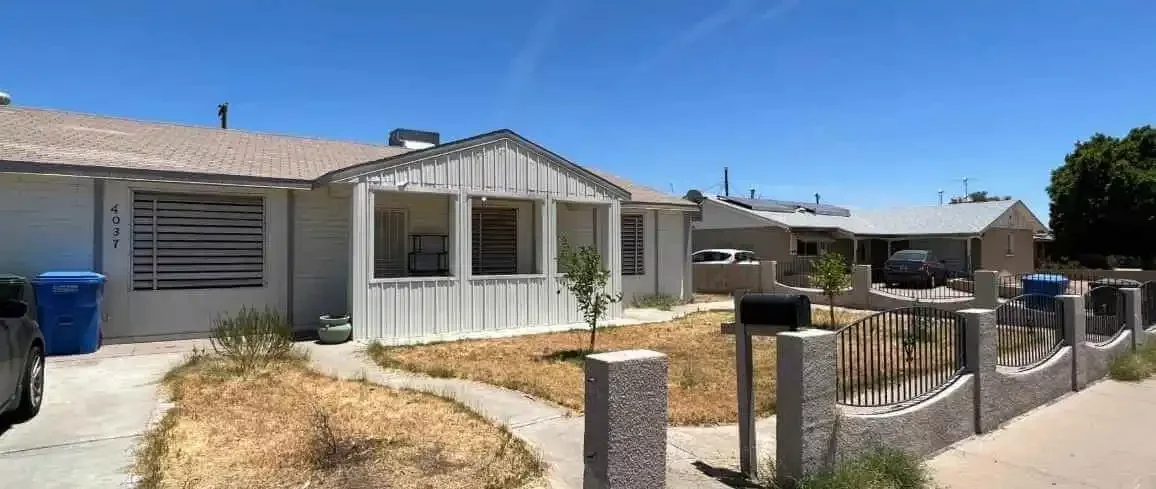Selling a Rental House in Phoenix? Understand the Tax Impact First
If you’re planning on selling a rental house in Phoenix, understanding the potential tax consequences is essential. Capital gains taxes, depreciation recapture, and timing can significantly affect your final proceeds.
While every landlord’s situation is different, this guide explains the most common tax considerations Phoenix property owners face when selling an investment property.
Important: This article is for educational purposes only and does not replace professional tax advice. Always consult a qualified tax professional regarding your specific situation.

Capital Gains Tax When Selling a Rental House in Phoenix
When selling a rental house in Phoenix, you may owe capital gains tax on the profit.
Your gain is generally calculated as:
Sale Price – Adjusted Basis = Taxable Gain
Your adjusted basis typically includes:
- Purchase price
- Certain improvements
- Minus depreciation taken over time
Long-Term vs Short-Term Capital Gains
- Short-term gains (property held under 1 year) are taxed as ordinary income.
- Long-term gains (held over 1 year) are taxed at lower federal capital gains rates.
Because Phoenix home values have appreciated significantly in recent years, many long-term landlords face sizable capital gains when selling.
Depreciation Recapture: The Often Overlooked Tax
One of the most important tax considerations when selling a rental house is depreciation recapture.
If you claimed depreciation on the property over the years, the IRS may require you to “recapture” that amount when you sell.
Depreciation recapture is typically taxed at a federal rate of up to 25%.
Many Phoenix landlords are surprised by how much this impacts their net proceeds.
You can review official IRS guidance on depreciation recapture and capital gains in IRS Publication 544 (Sales and Other Dispositions of Assets).
Arizona State Tax Considerations
In addition to federal taxes, Arizona may tax capital gains as part of your state income tax.
Because tax rules can change, it’s critical to review both federal and Arizona tax implications before making a final decision to sell.
You can review current Arizona income tax information through the Arizona Department of Revenue.
1031 Exchange Considerations
Some landlords consider a 1031 exchange to defer capital gains taxes.
A 1031 exchange allows you to reinvest proceeds into another investment property, potentially deferring taxes — but strict rules apply:
- You must identify replacement property within 45 days.
- You must close within 180 days.
- Funds must be handled by a qualified intermediary.
A 1031 exchange may not be appropriate for everyone, especially if you’re exiting rental ownership entirely.
Why Phoenix Landlords Are Selling Now
Many rental property owners in Phoenix consider selling because:
- Significant appreciation over the past decade
- Increasing maintenance costs due to Arizona heat
- Tenant management fatigue
- Changing interest rates
- Estate or inheritance planning
If your property needs repairs or updates, you may also weigh the cost of preparing it for market versus selling as-is.
Selling a Rental Property With Tenants in Place
If your Phoenix rental still has tenants:
- Lease agreements remain in effect until expiration
- Showings may require notice
- Investors may prefer occupied properties
Some landlords prefer a direct sale to avoid disrupting tenants or navigating listing complexities.
Learn more about selling rental properties here:
👉 Sell My House Fast in Phoenix
You can also review how our process works:
👉 How Our Home Buying Process Works
Should You List or Sell Directly?
When selling a rental property in Phoenix, landlords typically consider two options:
Listing With an Agent
- Potentially higher sale price
- Requires repairs, showings, and buyer financing
- May involve longer timelines
Selling Directly to a Local Buyer
- Sell as-is
- No showings required
- Flexible closing timeline
- Predictable terms
Not every landlord benefits from a direct sale. The right decision depends on your financial goals, tax position, and timeline.
Capital Gains Tax When Selling a Rental Property
When you sell a rental property in Phoenix, you may owe capital gains tax on the profit.
Your gain is generally calculated as:
Sale Price – Adjusted Basis = Taxable Gain
Your adjusted basis typically includes:
- Purchase price
- Certain improvements
- Minus depreciation taken over time
Long-Term vs Short-Term Capital Gains
- Short-term gains (property held under 1 year) are taxed as ordinary income.
- Long-term gains (held over 1 year) are taxed at lower federal capital gains rates.
Because Phoenix home values have appreciated significantly in recent years, many long-term landlords face sizable capital gains when selling.
Depreciation Recapture: The Often Overlooked Tax
One of the most important tax considerations when selling a rental house is depreciation recapture.
If you claimed depreciation on the property over the years, the IRS may require you to “recapture” that amount when you sell.
Depreciation recapture is typically taxed at a federal rate of up to 25%.
Many Phoenix landlords are surprised by how much this impacts their net proceeds.
Arizona State Tax Considerations
In addition to federal taxes, Arizona may tax capital gains as part of your state income tax.
Because tax rules can change, it’s critical to review both federal and Arizona tax implications before making a final decision to sell.
1031 Exchange Considerations
Some landlords consider a 1031 exchange to defer capital gains taxes.
A 1031 exchange allows you to reinvest proceeds into another investment property, potentially deferring taxes — but strict rules apply:
- You must identify replacement property within 45 days.
- You must close within 180 days.
- Funds must be handled by a qualified intermediary.
A 1031 exchange may not be appropriate for everyone, especially if you’re exiting rental ownership entirely.
Why Phoenix Landlords Are Selling Now
Many rental property owners in Phoenix consider selling because:
- Significant appreciation over the past decade
- Increasing maintenance costs due to Arizona heat
- Tenant management fatigue
- Changing interest rates
- Estate or inheritance planning
If your property needs repairs or updates, you may also weigh the cost of preparing it for market versus selling as-is.
Selling a Rental House in Phoenix with Tenants in Place
If your Phoenix rental still has tenants:
- Lease agreements remain in effect until expiration
- Showings may require notice
- Investors may prefer occupied properties
Some landlords prefer a direct sale to avoid disrupting tenants or navigating listing complexities.
Learn more about selling rental properties here:
👉 Sell My House Fast in Phoenix
You can also review how our process works:
👉 How Our Home Buying Process Works
Should You List or Sell Directly?
When selling a rental property in Phoenix, landlords typically consider two options:
Listing With an Agent
- Potentially higher sale price
- Requires repairs, showings, and buyer financing
- May involve longer timelines
Selling Directly to a Local Buyer
- Sell as-is
- No showings required
- Flexible closing timeline
- Predictable terms
Not every landlord benefit from a direct sale. The right decision depends on your financial goals, tax position, and timeline.
Frequently Asked Questions About Taxes on Rental Sales in Phoenix
Do I have to pay capital gains tax when selling a rental house in Phoenix?
Possibly. If the property appreciated and was held for more than one year, capital gains tax may apply. Your specific tax rate depends on your income and ownership duration.
What is depreciation recapture?
Depreciation recapture is a federal tax applied to the depreciation deductions you previously claimed on your rental property.
Can a 1031 exchange eliminate taxes?
A 1031 exchange may defer capital gains taxes if strict rules and timelines are followed. It does not permanently eliminate taxes and requires reinvestment into another qualifying property.
Does Arizona tax rental property sales?
Arizona includes capital gains as part of state income tax. Consult a tax professional for current rates and rules.
Talk With a Local Phoenix Home Buyer
If you’re evaluating whether to sell your rental property in Phoenix, it can help to speak with a local Arizona home buyer who understands investor scenarios.
For over 20 years, Oak Street Properties LLC has worked with Arizona property owners to provide straightforward, transparent selling options.
👉 Call Now (480) 637-5500
👉 Get My Cash Offer

